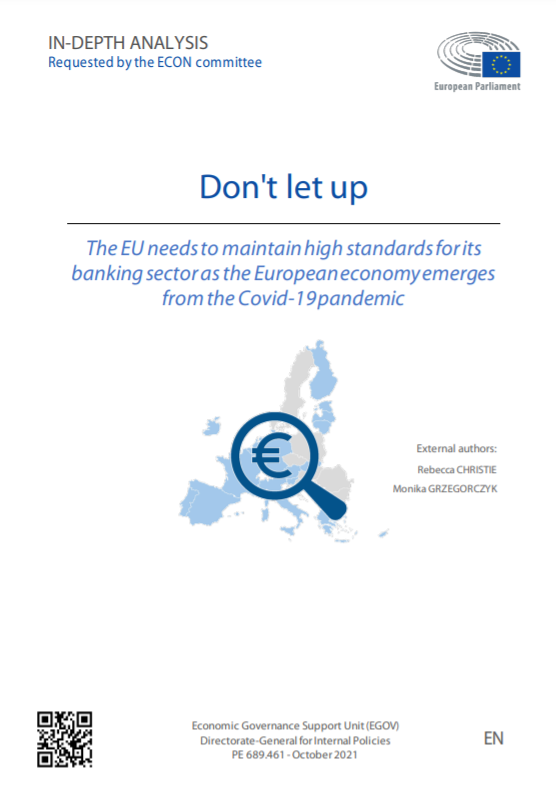Blog Post
The European Union must change its supervisory architecture to fight money laundering
Money laundering scandals at EU banks have become pervasive. The authors here detail the weaknesses the current AML architecture's fundamental weaknesses and propose a new framework.
Money laundering scandals at EU banks, often linked to Russia, have become pervasive. Reform of anti–money laundering (AML) supervision is urgent. Illicit actors have repeatedly moved billions of dollars through individual banks. This flow sustains the Kremlin’s patronage system at home by serving as an outlet for elites while it simultaneously corrodes institutions, commerce, and politics in Europe.
The current system, which leaves AML enforcement to national authorities, is broken. As we explained in a recent paper, a new EU agency tasked solely with AML supervision is the antidote. Without dramatic change, the problem will continue to fester.
The existing architecture has three fundamental weaknesses. First, national AML supervisors have no efficient way to communicate and coordinate, neither with one another nor with the European Central Bank, which has overall responsibility for bank oversight in the euro area. Second, the system leaves supervisors in very small countries on their own, with relatively limited capacity and resources, in the face of a sophisticated transnational threat. Third, it encourages the growth in ‘weak link’ countries of financial sectors catering to suspect clients of Russian and other origin. The outcome is undue political influence and sometimes even capture.
A dedicated European-level AML agency would solve coordination problems, develop strong capability and deep expertise, and enjoy sufficient political independence. This would result in more proactive supervision, more aggressive fines, and the establishment of credible deterrence.
Recent cases have touched Cyprus, Denmark, Estonia, Germany, Latvia, Malta, the Netherlands, and the United Kingdom. In the most dramatic case, €200 billion was pumped through the Estonian branch of Danske Bank, Denmark’s leading lender. At Danske Bank’s branch in Estonia, non-resident shell-company clients moved massive sums through a concentrated number of accounts, generating huge fees. Management knew that the clients represented unknown sources of money from Russia and the Commonwealth of Independent States, but they failed to act for years.
No one can say with certainty whose money transits these banks, and that is part of the problem. Professional facilitators set up opaque channels precisely to obscure the ultimate purpose of these transactions. Sometimes the proceeds of corruption may be used to purchase luxury real estate. Other times, the flow may stem from, or facilitate, organised criminal activity. And there is no reason that the Russian government could not tap these same networks to carry out interference activities in the West. The flow likely contains elements of all of these, and more.
Since 2012, the European Central Bank has been the prudential supervisor of all banks in the euro area, overseeing governance, capital adequacy, and lending practices. But AML supervision is excluded as a ‘business conduct’ issue, which remains the sole province of national authorities. Meanwhile, financial services are passported across the entire Single Market, and fines for AML violations have generally been small – although they have recently begun to increase in some member states.
As was the case with prudential supervision before 2012, today’s AML architecture leads to perverse supervisory incentives. It leaves too many avenues for untoward political and regulatory influence on the part of those who benefit from a reliance on money of dubious provenance, creating a vicious circle of supervisory failure in the more vulnerable countries. Even if some member states have effective AML supervisory regimes, the failure is systemic from a European perspective because there is always a weak link.
The fix, unavoidably, is a strong central authority at the European level. The European Union has recently decided to enhance the AML responsibilities of the European Banking Authority (EBA), but this change is too incremental to fix the problem. The EBA can only intervene too late and not forcefully enough. Under the soon-to-be-enacted legislation, it will be unable to do much until after a failure of national authorities has been established, and even then there would be no meaningful penalties.
Instead, a new agency should serve as a single information hub and a unitary decision-making body that takes proactive measures. The central authority may then re-delegate certain tasks and decisions to national agencies, as has happened with competition policy enforcement, or indeed prudential supervision, for example.
A new, dedicated EU AML agency should supervise banks and non-banks alike across the Single Market. It should not be the European Central Bank, because its authority would be limited to the banking sector and only within the euro area, leaving scope for weak links at non-bank institutions or in non–euro-area countries. As the US experience demonstrates, fragmentation of AML supervision across segments of the financial sector impairs its efficiency. In a first phase, at least, financial intelligence units would remain scattered at the member-state level, but the European AML supervisor can be equipped to interact with all of them in an efficient way.
To be sure, the creation of a new agency would increase the complexity of the EU supervisory landscape and should not be taken lightly. But the critical importance of AML supervision to the integrity of Europe’s financial system justifies the effort. It would also demonstrate to the general public that the European Union is able to address its most serious challenges credibly and not just tinker at the edges. AML reform is a top priority from a European financial sector and security perspective. It would be good European politics, too.
Republishing and referencing
Bruegel considers itself a public good and takes no institutional standpoint. Anyone is free to republish and/or quote this post without prior consent. Please provide a full reference, clearly stating Bruegel and the relevant author as the source, and include a prominent hyperlink to the original post.


















